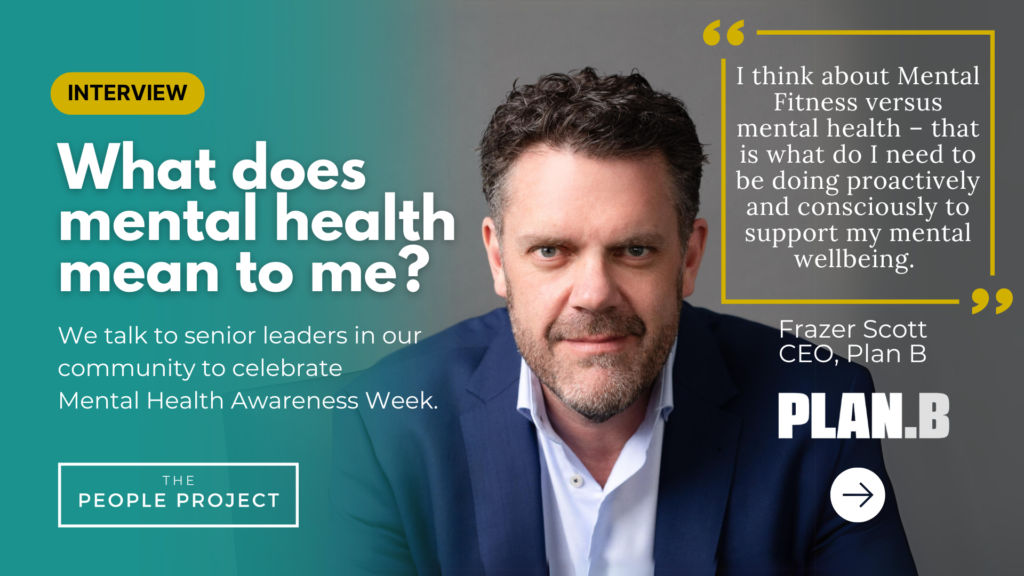Frazer Scott shares his insights with us. Frazer is the CEO of PLAN B Technology, a service provider for Cloud, Data Centre, Network and Business Continuity solutions.
Trigger Warning: Today’s post addresses suicide, which may be distressing for some readers. Please proceed with care and prioritise your well-being.
Frazer spent 15 years maturing as a people leader inside Microsoft which he says really shaped his fundamental skills, capabilities and values. While his first people-leader role came with no training-wheels, he was lucky to learn from an incredible community of leaders. Frazer says the most common trait the great leaders all shared was a growth mindset, and a servant-leader orientation.
Let’s hear from Frazer:
- What does mental health mean to you, and why do you think it’s important to talk about it openly?
The most humbled and challenged I’ve been as a leader is when a colleague I genuinely care about, told me that; if they decide to take their life, I should know there is nothing I could do or say that would have changed their mind.
It broke me. I mean, what do you do with that? And how intolerable must it be for them to get to that point?
I grew up at a time where mental health was not as openly spoken about as it is today. Thankfully we’ve matured a little.
At Plan B, we’re blessed to have some great mental health advocates that speak openly about mental health challenges, the available tools and support networks that exist to help. Having seen how engaged the team have become from this and how openly these issues are now discussed has shown the power of getting these issues into the light.
- How do you prioritise your mental health in your daily life?
I think about Mental Fitness versus mental health – that is what do I need to be doing proactively and consciously to support my mental wellbeing. As a CEO, husband and father, there are huge demands on time and focus – but I’ve learnt that I need to be selfish about my own needs first. Whether that’s physical exercise, mindfulness or just spending time alone – which I think is pretty common for those of us who live on the border between introversion and extroversion.
I’ve also learned to dial into symptoms: If anxious work thoughts are regularly waking me up at 2am I’m in need of a holiday, or dial up the meditation.
- What are some of the biggest challenges you face when addressing mental health in the workplace, and how do you overcome them?
Probably two things:
The legacy attitude of ‘harden up’, or ‘what’s their problem’. I don’t think it’s malicious. But it is ignorant, and unhelpful. This is of course changing and actions like Mental Health Awareness Week really help normalise the discussions.
Secondly, when we do have an issue, there is a lack of resources to lean on in our healthcare sector. Health insurance doesn’t generally cover mental health challenges, and there is a real supply issue of qualified care out there. So we lean on what we can provide, things like EAP and our HR Partners – with the experience to support and educate our teams.
- What advice would you give to other CEOs or leaders who are hesitant to address mental health in their organisations?
I don’t feel I can lead in this space as I haven’t lived it. I can however create the space, frameworks and resources for those that can.
So I’d say, find an advocate. Someone who has lived mental health issues. Someone who can communicate and normalise the discussion and open pathways of discussion, and also be a support person for anyone else suffering. Make it a conversation that occurs regularly enough so that it normalises the conversation, and lets the team know their colleagues and company care, and genuinely want to help.
#MHAW #peopleandculture #community



